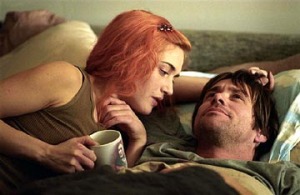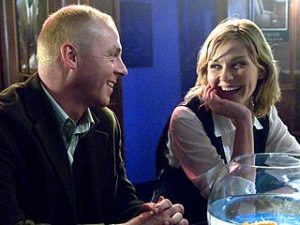
Kate Winslet and Jim Carrey make great bedfellows in "Eternal Sunshine of the Spotless Mind."
Apparently, I’m an insult to my gender … when it comes to my intense aversion to chick flicks, that is.
That information, you see, comes from the mouth of a friend (I won’t divulge the name even though I’m tempted to because he once had the audacity to say that Johnny Depp made a BETTER Willy Wonka than Gene Wilder). A conversation about movies turned ugly when I began — as I am wont to do — bashing chick flicks in general for their mushy dialogue, mawkish sentimentality and generally horribly inaccurate depictions of what relationships are really like.
Shock, awe and general disbelief ensued. “What? You hated ‘Pretty Woman’? You can’t sing every line to every song in ‘Grease’? You didn’t cry when Kate bid farewell to a frozen-solid Leo in ‘Titanic’? You vomited popcorn into your own mouth when Renee discovered she “completed” Tom in ‘Jerry Maguire’? What kind of girl are you?”
OK, OK, fine, so I took some liberties with the dialogue (what’s a little exaggeration between friends, right?). But the central thesis remains: A girl isn’t really a girl unless she weeps uncontrollably when Patrick crosses over in “Ghost,” or swoons when Brad flashes his pearly whites at Julia in “Legends of the Fall” (reminder: if the chick commits suicide in the end, it’s not romantic).
What kind of touchy-feely, Hallmark-card Nicholas Sparks horse manure is that? Every crappy chick flick — “Pretty Woman” and “Grease” included — is built upon the same ridiculous premise: That all women are sittin’ around twiddlin’ our thumbs waiting (sigh) for some gallant dude to rescue us from, oh, take your pick. It’s insulting, and every half-baked chick flick that uses this idea as its backbone is, well, crap.
So I propose a revolution of sorts, a redefining of what chick flicks SHOULD be. And what better way to do that than (suppress your groans) looking at the few (very few) chick flicks that get it right? So here it is, readers: my list of chick flicks for people who, you know, hate chick flicks:
5) “Pride & Prejudice” (2005) — I may be flogged for choosing this latest adaptation of Jane Austen’s most beloved book, but I care not; bring on the beating. Keira Knightley and Matthew Macfadyen were perfectly matched as the spirited Elizabeth Bennett and a dour, sulking Mark Darcy. For two-thirds of the movie, they fight, they find fault, they ignore their true feelings (how’s that for realistic?), and when they finally give in there’s a sense they will be happy because they accept each other, warts and all, good and bad. I can’t think of anything more romantic than that.
4) “Kissing Jessica Stein” (2001) — Best friends Jennifer Westfeldt and Heather Juergensen adapted this sweet but not sappy story from a stage show they created. Westfeldt is neurotic brilliance as Jessica, a closed-minded pessimist who answers a personals ad written by Helen (Juergensen). The problem? Jessica’s a decidedly linear-thinking heterosexual. Watching her open her heart and mind to new possibilities in a most unexpected relationship is funny, strangely touching and extremely rewarding. Talk about a happy ending.
3) “Muriel’s Wedding” (1995) — Toni Collette is a force to be reckoned with as Muriel, a fat, schleppy slacker who spends her miserable existence listening to ABBA tunes and believing that marriage — to anyone, really — is her ticket to a life of happiness. (Yes, someone saw “Cinderella” a few too many times.) This little seen gem of a rom-com digs beyond the shiny-happy “Gimme Gimme Gimme” surface and reveals something shocking: Love means jack if you hate yourself. Imagine that.
2) “Eternal Sunshine of the Spotless Mind” (2004) — Call this one the Thinking Viewer’s Chick Flick. As deep and complex as it is rich and touching, “Sunshine” features one of the most memorable (and realistic) romances ever seen on the silver screen. Dumped by Clementine (Kate Winslet), Joel (Jim Carrey) elects to have his memories of Clem erased … only to discover too late he’s not ready to let go. The characters, the quietly mesmerizing dialogue — if it doesn’t break your heart right in half, I suspect you don’t have one.
1) “Harold and Maude” (1971) — There never has been (and never will be) a rom-com that can come close to surpassing this cult classic about a life-changing romance between Harold (Bud Cort), a death-obsessed, life-hating teen, and Maude (Ruth Gordon), a free-spirited eternal optimist fast approaching her 80th birthday. This well-written, gleefully dark and tender comedy reminds us what Bertrand Russell so wisely said: “To fear love is to fear life, and those who fear life are already three parts dead.” This movie will change your life — I guarantee it.
Filed under: List-o-matic, Random Thoughts | 4 Comments »





 There are two kinds of alcohol/drug addiction movies: ones that are as loud, sloppy and insistent as a last-call drunk, and those that are as bleak and haunting as a junkie’s pinned-pupil gaze.
There are two kinds of alcohol/drug addiction movies: ones that are as loud, sloppy and insistent as a last-call drunk, and those that are as bleak and haunting as a junkie’s pinned-pupil gaze.

